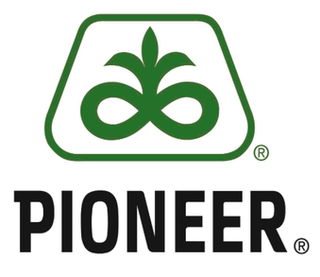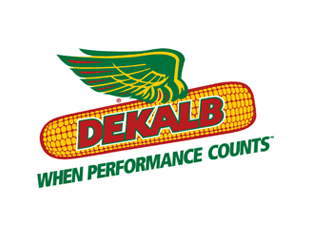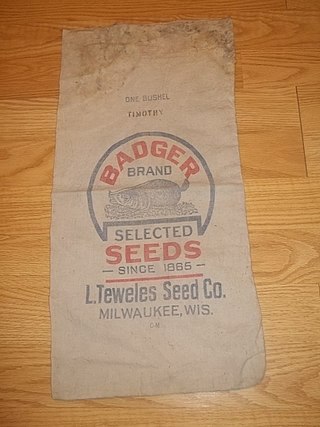History
In 1931, Garst and Thomas Hi-Bred Corn Company was founded by Roswell Garst and Charley Thomas in Coon Rapids, Iowa, and was "instrumental in promoting the use of hybrid corn." [1] During the Cold War, Garst formed a relationship with Nikita Khrushchev and assisted the USSR in modernizing its corn production. [1]
In 1983, the company split up and Garst Seed Company was formed. [1]
In 1985 Garst was acquired by Imperial Chemical Industries's American subsidiary. [1]
In 1993, ICI sold off its North American assets, and Garst seed business became part of a new company called Zeneca. [1]
In 1996, Garst became part of Advanta Group, formed through the merger of Zeneca Seeds and VanderHave. [1] Zeneca became part of AstraZeneca and VanderHave was controlled by a Dutch farmer-owned co-operative called Cosun U.A. [2]
In 2004, Astrazeneca and Cosun sold Garst to Syngenta. [1] [3]
In 2013, Syngenta announced the retirement of the Garst seed brand. Operations ceased in 2014 and remaining Garst hybrid corn seed products were rebranded to Golden Harvest. [4]

Imperial Chemical Industries (ICI) was a British chemical company. It was, for much of its history, the largest manufacturer in Britain. It was formed by the merger of four leading British chemical companies in 1926. Its headquarters were at Millbank in London. ICI was a constituent of the FT 30 and later the FTSE 100 indices.
The Monsanto Company was an American agrochemical and agricultural biotechnology corporation founded in 1901 and headquartered in Creve Coeur, Missouri. Monsanto's best-known product is Roundup, a glyphosate-based herbicide, developed in the 1970s. Later, the company became a major producer of genetically engineered crops. In 2018, the company ranked 199th on the Fortune 500 of the largest United States corporations by revenue.

Coon Rapids is a city in Carroll and Guthrie counties in the U.S. state of Iowa. The population was 1,300 at the 2020 census, which is a decrease of 5 from the 2000 census. The small portion of Coon Rapids that lies in Guthrie County is part of the Des Moines–West Des Moines Metropolitan Statistical Area.
Roswell "Bob" Garst was an American farmer and seed company executive. He developed hybrid corn seed in 1930 that allowed greater crop yields than open-pollinated corn. He was perhaps most well known for hosting Nikita Khrushchev on his farm in Coon Rapids, Iowa, on September 23, 1959. He sold hybrid seed to the Soviet Union beginning in 1955 and played a role in improving US-Soviet communication.
David Garst, was a seed industry leader, farmer, and former Executive President of Garst Seed Company. He also worked in the livestock, fertilizer, and chemical businesses, and contributed to foreign agricultural development projects in Eastern Europe, Central America, and the Caribbean. Garst believed that farming in the United States is fettered by governmental and environmental regulation.

Orville Clarence Redenbacher was an American food scientist and businessman most often associated with the brand of popcorn that bears his name which is now owned by Conagra Brands. The New York Times described him as "the agricultural visionary who all but single-handedly revolutionized the American popcorn industry".

Syngenta is a global agricultural technology company headquartered in Basel, Switzerland. It primarily covers crop protection and seeds for farmers. Syngenta is part of the Syngenta Group, entirely owned by Sinochem, a Chinese state-owned enterprise.

Pioneer Hi-Bred International, Inc. is a U.S.-based producer of seeds for agriculture. They are a major producer of genetically modified crops with insect and herbicide resistance.
Devgen is a Belgium-based multinational agricultural biotechnology company. It uses biotechnology and molecular breeding technologies to develop varieties of food crops. Its technology is marketed by outlicensing or selling seeds in India and South-East Asia. Devgen also develops nematicides.

Northrup-King Seed Company was founded in Minneapolis, Minnesota in 1896, and was based there until it was acquired and moved to Golden Valley, Minnesota in 1986. It is now a division of Syngenta.
This article is intended to give an overview of the economy of Delaware.

DeKalb Genetics Corporation was a diversified company headquartered in DeKalb, Illinois that marketed agricultural seeds and other products. The company was best known for its leading role in the development of hybrid corn and for its "winged ear" logo. DeKalb Genetics Corporation was purchased by the Monsanto Company in 1998 and has been owned since 2017 by Bayer. The DeKalb seed business, the DEKALB brand and the winged ear logo are now owned and managed by Bayer.
The Roswell and Elizabeth Garst Farmstead Historic District is a farm in Guthrie County, Iowa, United States, near the city of Coon Rapids. It is significant as the home of farmer and hybrid corn populizer Roswell Garst. During the 1930s and 1940s, Garst played an active role in the conversion of old-style family farms to modern agribusiness. He was a key marketer of hybrid seed corn, which greatly increased corn yields per acre. Further, he espoused the use of nitrogen and other chemical fertilizers to renew soil so that fields need not be left fallow in order for the soil to replenish, allowing farmers to grow more acres of corn. Additionally, he embraced the use of cellulose from corncobs left after processing seed corn as cattle feed.

Mesotrione is a selective herbicide used mainly in maize crops. It is a synthetic compound inspired by the natural substance leptospermone found in the bottlebrush tree Callistemon citrinus. It inhibits the enzyme 4-hydroxyphenylpyruvate dioxygenase (HPPD) and is sold under brand names including Callisto and Tenacity. It was first marketed by Syngenta in 2001.
4-Hydroxyphenylpyruvate dioxygenase (HPPD) inhibitors are a class of herbicides that prevent growth in plants by blocking 4-Hydroxyphenylpyruvate dioxygenase, an enzyme in plants that breaks down the amino acid tyrosine into molecules that are then used by plants to create other molecules that plants need. This process of breakdown, or catabolism, and making new molecules from the results, or biosynthesis, is something all living things do. HPPD inhibitors were first brought to market in 1980, although their mechanism of action was not understood until the late 1990s. They were originally used primarily in Japan in rice production, but since the late 1990s have been used in Europe and North America for corn, soybeans, and cereals, and since the 2000s have become more important as weeds have become resistant to glyphosate and other herbicides. Genetically modified crops are under development that include resistance to HPPD inhibitors. There is a pharmaceutical drug on the market, nitisinone, that was originally under development as an herbicide as a member of this class, and is used to treat an orphan disease, type I tyrosinemia.

L. Teweles Seed Co. was created in 1865 and became the second largest forage seed company in North America, only behind Northrup-King. Over the years the company had many of the industry’s firsts including, putting seed in a handy sized bags, bulk seed handling, dying bluegrass seed blue and radio advertisings. The firm was a family-run business over 4 generations until it was later acquired by Kent Feeds, Inc. of Muscatine, Iowa in 1972 for an undisclosed amount.

The StarLink corn recalls occurred in the autumn of 2000, when over 300 food products were found to contain a genetically modified corn that had not been approved for human consumption. It was the first-ever recall of a genetically modified food. The anti-GMO activist coalition Genetically Engineered Food Alert, which detected and first reported the contamination, was critical of the FDA for not doing its job. The recall of Taco Bell-branded taco shells, manufactured by Kraft Foods and sold in supermarkets, was the most publicized of the recalls. One settlement resulted in $60 million going to Taco Bell franchisees for lost sales due to the damage to the Taco Bell brand.
Golden Harvest is a U.S.-based brand wholly owned by Syngenta. Syngenta markets hybrid corn seeds and soybean seeds for agriculture under the brand.
Genetic engineering in Hawaii is a hotly contested political topic. The Hawaiian Islands counties of Kauai, Hawaii and Maui passed or considered laws restricting the practice within their borders due to concerns about the health, the environment and impacts on conventional and organic agriculture.
Stine Seed Company is the world's largest private seed company, and the largest independent seed company in the US. It has more than 900 patents, specializing in soybean and corn genetics, is based in the small town of Adel, Iowa, and is almost entirely owned by Harry Stine and his four children.









